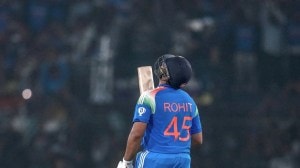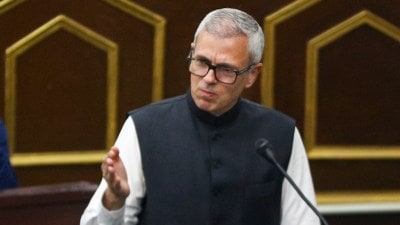Stay updated with the latest - Click here to follow us on Instagram
Wrong notes: The reality of government schools in Udhampur
In most Udhampur schools, teachers who say fossil fuel is ‘waste collected from households’, class 10 students can’t ‘read’ and laboratories that are used as classrooms.
 With just six classrooms, the junior students of City High School are made to sit in the open. (Source: Express photo by Mir Imran)
With just six classrooms, the junior students of City High School are made to sit in the open. (Source: Express photo by Mir Imran)
He is 17 and is taking his Class X Board exams this week. His teachers at the Government City High School in the heart of Udhampur town are worried. The reason: the 17-year-old “cannot read a word” of his Hindi or English textbook. And he is not the only one. Of the 35 students in the school appearing for the exam conducted by the Jammu and Kashmir State Board of School Education (JKBOSE) this week, there are at least two other such students in the class, the teachers say.
However, an inspection earlier this month by Udhampur deputy commissioner Shahid Iqbal Choudhary of government-run schools found that the problem wasn’t confined to students. Even the teachers fumbled when Choudhary asked them for answers to simple questions — the digestive system or a basic math formula. A science teacher with BEd and MA degrees defined fossil fuel as “waste collected from households”. All the 17 teachers in the school have a graduate degree, some even have an MA with decades of teaching experience. Six teachers are in the ‘master grade’.
[related-post]
While the deputy commissioner has put salaries of all the teachers at the school on hold till the next inspection, teachers say it is in fact the government’s policy of not holding back any student up to Class VIII that is responsible for the poor academic performance.
Of the five exams that students of Class VIII have to take, two exams (Terminal 1 and 2) with a total of 60 marks are conducted by JKBOSE. The other three exams (Unit 1, 2 and 3) are worth 40 marks and the answer sheets in this case are checked by the class teachers.
“Students need 33 marks out of 100 to pass the exams. The school teachers simply give all students minimum marks in the unit tests, so the results of JKBOSE become irrelevant,” says a source in the education department.
Less than a fortnight before Choudhary’s visit, Chief Education Officer Bishan Singh Jaral had sought an explanation from headmaster Kamlesh Kumari, a BA, BEd with nearly 30 years of teaching experience, about the poor teaching standards in the school.
“During my visit I found that teachers had not even checked the students’ homework. The school laboratory was being used as a staffroom by teachers and there was a TV lying on the table. The almirahs were stacked with sports material,” says Jaral.
Upgraded from middle to high school, the school has 35 students in Class X, 50 in Class IX and 33 in Class VIII. In the primary sections, the strength of the students has been reduced to single digits — four in Class II, eight in Class III and nine in Class IV.
With just six classrooms, most of the students till Class V sit in the open. Nearly half a dozen rusting almirahs with 400-500 books serve as a library. The collection of books has not been updated since the ’70s. There’s a safai karamchari on the rolls, but the toilets remain unclean.
The situation is no different at the other government schools in Udhampur. Of the six classrooms at the Government Girls High School, Class IX (40 students) and X (29 students), with two sections each, are accommodated in four of them. The three students of Class VI and seven each of Class VII and VIII are “adjusted” in the remaining two rooms, with a row of almirahs serving as the division between the classes.
Most of the 600 books at the ‘library’ are outdated. The last time the school bought new books was three years ago. The school’s 17 teachers — for 86 students — have graduate and post-graduate degrees.
Only 32.91 per cent of the students at City High School and 56 per cent at the Girls High School managed to clear their Class X exams in 2015. “What can we do? We usually get students who are rejected by other institutions and in some cases, the parents are least interested in the education of their wards,” says Yash Pal, headmaster at the Government Girls High School. “Those who can afford it usually opt to private schools,” said Kamlesh Kumari of City High School.
The teachers at these schools admit that they send their children to private schools. “Who wouldn’t want their children to study in a better environment, where the classes aren’t dingy and the toilets are cleaner?” says Ishtiaq Ahmed, an Urdu teacher at City High School.
Many parents in Udhampur too prefer to put their children in private schools, despite the fee digging a hole in their pockets. “I have two children and paying such a high fee disturbs our monthly budget. But what is the option? Government school teachers have little knowledge and do not take their jobs seriously,” says Surinder Kumar, whose son studies at a private school.
The recent inspections have come at a time when the J&K government is holding screening tests to verify degrees of government school teachers employed under the Rehbar-e-Taleem (ReT) scheme — a programme to employ local village youth as teachers. Last year, the High Court had asked for verification of the degrees after an ReT teacher from South Kashmir failed to write an ‘essay on cow’ and solve a Class IV math problem given by Justice Muzaffar Hussain Attar. The marksheet issued to the teacher by the Board of Higher Secondary Education, Delhi, showed that he had secured 74 per cent marks in Urdu, 73 in English and 66 in Math.
According to Smitha Sethi, Director of School Education, J&K, the poor standard of education and infrastructure in the 1,500 schools of Udhampur is reflected in most of the 12,234 schools across Jammu. “There are 894 high schools and higher secondary schools across Jammu region. Of these, 18-20 schools fall in the winter zone and got zero per cent result in last year’s Class X exams,” she says.







